
Strange Cargo (1940) is not an easy film to describe. It has elements of drama, romance, adventure and tragedy. It is all these things, but it does not fit neatly into any of these genres. It could perhaps be compared to I Was A Fugitive of a Chain Gang, with its frank depiction of prison life in an unyielding environment with inhumane treatment. It also has elements of The Most Dangerous Game, where, too, the environment is deadly and the main characters are being hunted.

But Strange Cargo, is also not really a prison film or a thriller. And while it’s plot may seem fairly straightforward at face value, it is not. Both the deeper themes of the film, which is unsurprising with Joseph L. Mankiewicz in production, and the performances from Gable, Joan Crawford and especially Ian Hunter, make it something more, something, as I’ve said, very difficult to define.

Gable plays Verne, a hardened thief who has tried to escape a French Guinea prison many times, but has been repeatedly caught due to the dense, inhospitable jungle and the danger of the native people. This time he is caught due to being ratted out by Pig (Peter Lorre in a familiar role that he plays with no less aplomb), who sees him crouching at the dock and harassing a local prostitute and singer, Julie (played by Joan).
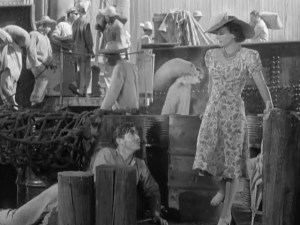
A few days later, Verne manages to evade the guards once more, with the mysterious help of a new prisoner, Cambreau, and go and see Julie, who tricks him and gives him up to the guards. But Julie is also punished by being deported, even though she has no way to leave the island legally due to having no money. She is forced to go with another shady character, Dufond, who eventually tries to molest her. Cambreau mysteriously stops her from killing Dufond, though.

At the prison, Verne finds out about an escape plan led by another prisoner, Moll. But is double crossed because Moll hates him. However, Cambreau leaves a map for him in a bible and Verne and Julie are eventually reunited, and begin to care for each other. But the journey to the main land is fraught with disaster, with Cambreau providing comfort to each prisoner as their darkest hour dawns upon them.
This, in my opinion, is an unusual role for Gable at the height of his career. In pre-code he played the heavy, the evil man, but when stardom dawned, he became the hero. In this film, he is no such thing. He is no less the embodiment of masculinity of the age, with his black hair falling over one eye and his signature moustache, but here he is morally ambiguous, outwardly cruel at times, especially to the much abused Julie.

But to me, this is one of Gable’s strongest, and most memorable performances. What is even more impressive, is that he was in this movie a year after the cultural phenomenon that was and is, Gone with the Wind, and Verne is nothing like Rhett Butler. He lacks the charm, sophistication and like ability of the gentleman from Charleston. If anyone says that Gable was afraid to play different roles, these two roles disprove that quite smartly.
Gable does not try to endear himself to the audience. He does not try to make you root for him because he is the protagonist, who is actually more of an antagonist for much of the film, especially in comparison to Cambreau. Cambreau is the one that the audience wants to see succeed, but I could not help finding myself hoping that Verne would be redeemed. This is perhaps because Gable, who was my first classic film star love, and has always reminded me of my grandfather, plays the role. But that’s not really it. It’s because Gable plays the role with lovely nuance. He does not make Verne into a cardboard villain. He shows that Verne is a product of an incredibly harsh system, one that has hardened him so much that he is on the brink of becoming inhumanely selfish and self serving.

It is not only Cambreau, the Christ like figure who leads them through the wilderness, who is gentle with murderers and maniacs, who comforts Julie and treats her with unusual respect, and wants to be Verne’s friend, who you eventually only care for, but Verne, too. Because Gable shows you glimmers of another man beneath that cruelty and ugliness. A man who is not entirely cynical about Cambreau’s gentleness, and who can love Julie as a woman, and not a cheap thing.

What is particularly moving about Gable’s performance is his eyes. To me, his eyes were always the secret of his allure, his talent. He could, like Joan, convey so much with them, but not in an affected way. As Verne, his eyes show vulnerability, the sting of betrayal, the smallest glimmer of hope for something, maybe even redemption. He shows the development of his character so gradually, that when it does eventually become obvious, it is not forced or strange, but believable. Although this is thanks to Gable’s talent, and not entirely the script, which has a last scene that is a bit too hidey ho for me.
Joan’s performance in this film, as always, is superb. Many biographers, commentators and classic film fans have said that all Joan was interested in was stardom. Eh hem. I think that this film pretty much puts a damper on that claim. While Julie begins the film with a bow in her hair, rouge on her lips and a sparkly evening dress, Joan spends much of the film in a torn dress with only make up necessary to show her face on camera. Her hair is combed back and her eyebrows are not filled in. It is very clear that Joan is committed to the role and not her own vanity at all.

As Julie she is initially hardened and cynical, but it becomes apparent that like Verne, she has been badly abused. Because this is a code film it cannot be expressly said, but it is suggested in Julie’s conversation with Cambreau that she may have been raped and forced into prostitution. Once again, Joan shows so much layering in her performance. Like Barbara Stanwyck, Joan was exceptional at showing how women who were seemingly cynical were striving to survive in a world of abusive, exploitative men. Julie isn’t your standard “hooker with a heart”, she recognises Cambreau’s goodness because he shows it to her, and she allows him to.


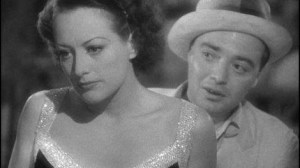
She decides to leave Verne, and she does sacrifice so much for him, but she doesn’t do it in a tragic way, she shows her strength right down the line. In true Joan fashion.
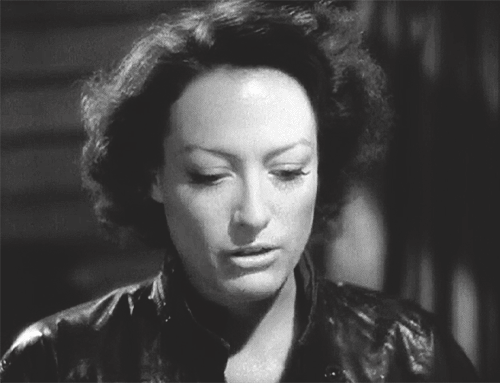
This was Joan and Gable’s last onscreen pairing, which is a pity, as they were incredible together. But it is a fitting film for their dynamic match and their varied careers. This film shows the maturation of their respective careers. This film could not be more removed from Dance Fools Dance, in which their brilliant mutual charisma and blossoming talent is so apparent. Here they play two world weary, almost middle age characters. There is no clean happy ending in this film. This film shows the fruits of a long professional relationship, and pitch perfect understanding of one another’s techniques and approaches to their craft. There are no false starts or moves. They don’t even need to speak to communicate their character’s feelings towards each other.

Not only is Gable exceptionally supported by Joan, but also by Ian Hunter, who was a countryman of mine. Hunter’s approach to his role is incredibly subtle, pitched just at the right level so that Cambreau’s Christlike actions are unmistakable but not at all hammy. Where Gable is passionate and angry and all over the screen, Hunter provides a quiet support.

He almost steals the film from Gable with his ability to switch from one characteristic and action to another, without a single glimpse of a seam. Cambreau could easily be a boring, holier than thou character who sermonises and looks wistfully at the sky. But both the script and most importantly Hunter’s performance don’t even go near that well tread territory. He shows the gentle, necessary compassion of Cambreau, his ability to cause self realisation in others, but not in a way that is apparent.


Verne remarks on this Julie, how Cambreau is able to suggest, guide, but never to force. Julie says that Cambreau recognises a need in others for comfort and redemption, but in a way that is good, and not fanatical. Hunter gives a good performance in every role I’ve seen him in, but in this film he is exceptional. This is as much his vehicle as it is Gable and Joan’s. The three of them should have been in a series of films together.

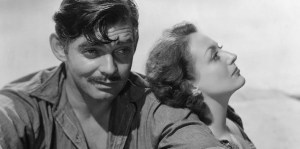
The film did well at the box office, and despite critics being mixed in their reception of it upon its release, I think that Film Daily’s assessment is spot on:
“Here is a good, raw, stark melodrama which holds suspense from the start. Frank Borzage has given it expert directorial attention…Clark Gable fits his role admirably…The acting is high-grade with Joan Crawford giving her best performance to date.”
Source: Wikipedia, Strange Cargo (1940)
Although as I have said, this film goes beyond melodrama. It will stay with you for a good while after you watch it. It will make you think of a good many things, about life, about society, about what really lies beyond our existence. It’s a curiosity in the studio system, one worth seeking out.
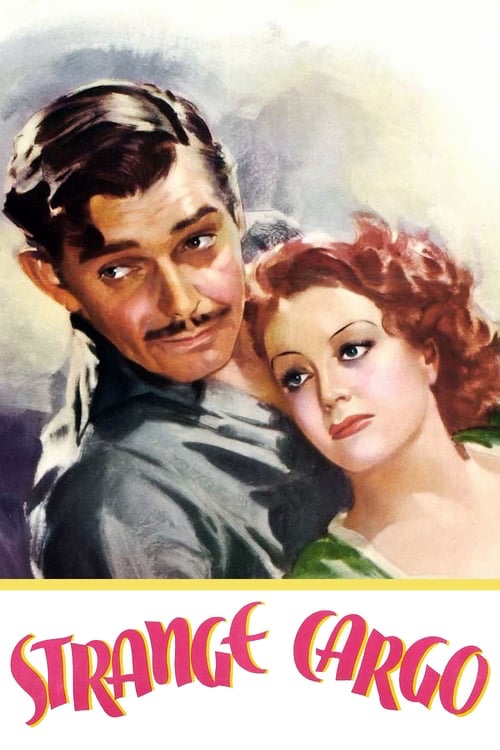


This is my contribution for the Dear Mr Gable: A Celebration of the King of Hollywood Blogathon being hosted by the ever gracious Love Letters to Old Hollywood. Please visit her blog for more information and to read everyone’s contributions.



Brilliant review, Gabriela! 🥰
This is a film that I haven’t given too much attention because I didn’t quite like it upon first viewing. It’s definitely more serious and darker than Gable & Crawford’s other pairings. The settings were incredibly bleak. Your article gives me the nudge to rewatch this film and update my analysis, just as I was able to do with ‘Rain’.
Joan was certainly not in Hollywood just to be a star. She wanted to dance, sing… just perform, which made her so happy. Looking beautiful was a perk but she could get along without it, just like in ‘Possessed’ (1947) and ‘Straight-Jacket’.
It’s such a great thing that they were able to do several films together. ❤
LikeLiked by 1 person
Thanks so much Erica 💖 I’m so glad you enjoyed it! I really hope you enjoy it more on your second viewing. Yes it isn’t an easy film to watch, but very worth it 😊 Yes I’m so glad they were paired together so often! 💓
LikeLiked by 1 person
The film fascinates me but I have to make the time for it. I had a feeling it would need solitude and time to appreciate, and your excellent review seems to validate that feeling.
– Caftan Woman
LikeLiked by 1 person
Thanks so much 💖 I’m so glad you enjoyed it. Yes it is a film that definitely requires quiet contemplation 😊
LikeLike
This is such a fascinating movie! The religious subtext is very interesting to say the least. And, yes, Gable and Crawford are extraordinary. Great review!
LikeLiked by 1 person
It really is! Thanks Eric 🌟
LikeLiked by 1 person
“But Strange Cargo, is also not really a prison film or a thriller. And while it’s plot may seem fairly straightforward at face value, it is not. ”
Not only do I agree, but I would offer another comparison to films you listed…to me, this film always felt like it at least inspired parts of Steve McQueen’s “Pappilion.”
LikeLiked by 1 person
Spot on Dub! I totally agree!
LikeLike
Superb review! I can’t wait to see this film now. I had always been led to believe that this was one of Gable and Crawford’s lesser collaborations, but it sounds like I’ll just have to see it for myself. I loved all the photos you included as well.
Thanks for contributing to my blogathon! (And sorry for the late comment, I’ve been out of town.)
LikeLiked by 1 person
Thanks Michaela! I so hope you enjoy it 🌷 thank you for letting me take part. I really enjoyed it!
LikeLike
I loved how you described Strange Cargo compating it toTthe Most Dangerous Game and I am a Fugitive from a Chain Gang. It’s a difficult film to describe, and the comparison is spot on.
Indeed, Gable could show so much with his eyes, and Crawford was never afraid of challenging herself for a role. And Ian Hunter is just amazing in this film. Your review is great!
Kisses!
Le
LikeLiked by 1 person
Thanks my love! I’m so glad you enjoyed it!
LikeLike